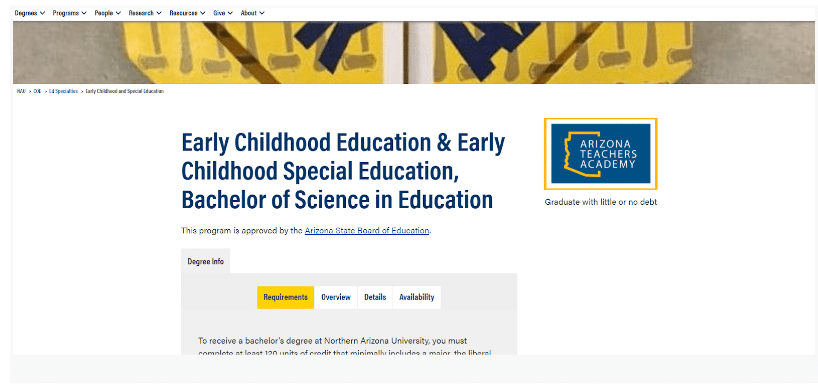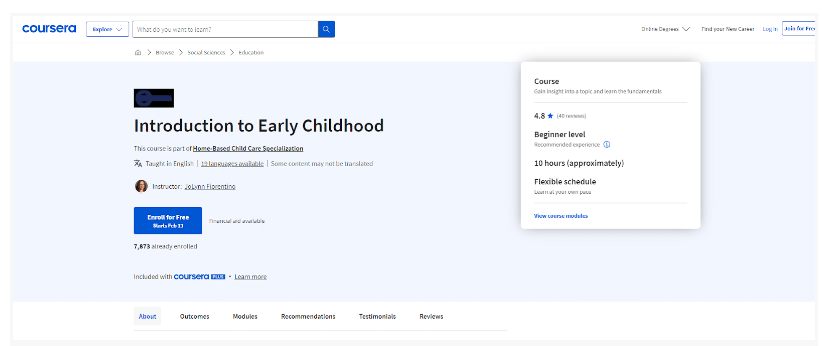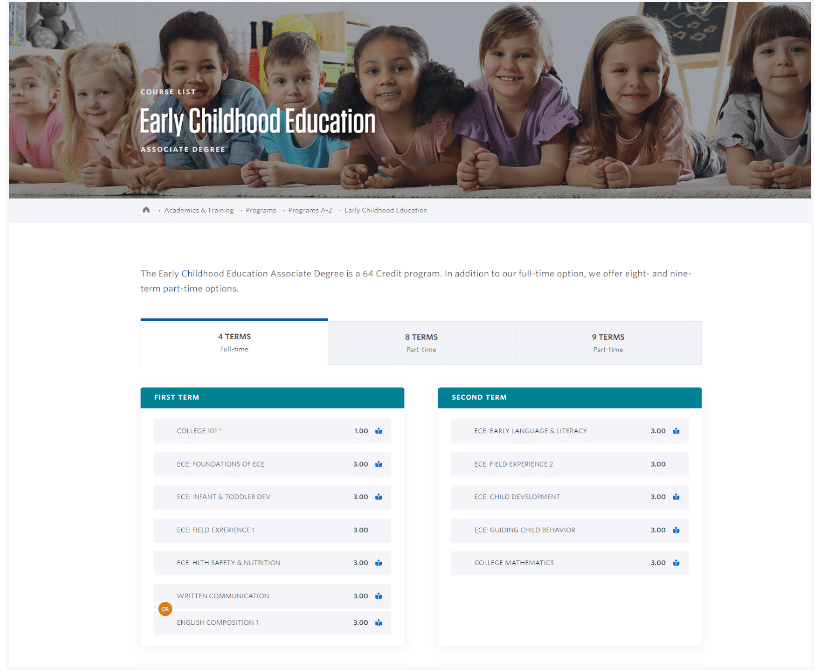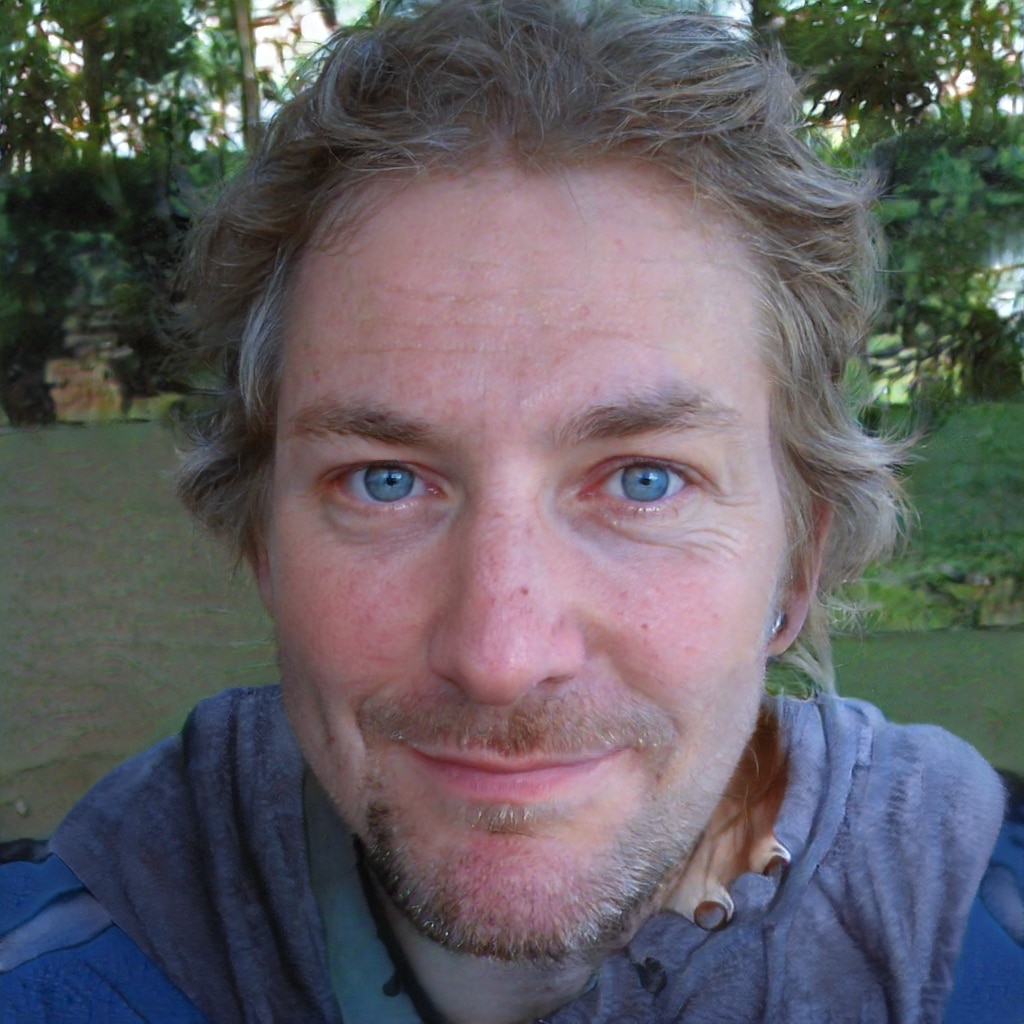The foundation of a child’s development is laid in their early years. Early Childhood Education (ECE) courses equip aspiring educators with the knowledge and skills to nurture and guide young minds during this crucial stage.
However, traditional ECE programs might not cater to everyone’s needs or learning styles.
This article explores the diverse landscape of available ECE courses and alternative pathways for those seeking to impact young learners positively.
Whether you’re a future teacher, parent, or simply passionate about child development, understanding the various options within ECE can empower you to find the best fit for your goals and aspirations.
Early Childhood Education
This course is designed to introduce learners to the fundamentals of early childhood education, focusing on the development and learning of young children from birth through age eight.
Ideal for aspiring educators, parents, and anyone interested in the growth and development of children, this course covers key concepts in child development, teaching strategies, and the importance of creating supportive learning environments.
Through simple explanations, engaging activities, and practical advice, participants will learn how to foster a love of learning in young children and support their development in critical early years.
Course Syllabus Preview:
Our course syllabus is structured to ensure a comprehensive understanding of early childhood education, making it accessible and actionable for all learners. Here’s an overview of the major topics and their subtopics:
I. Introduction to Early Childhood Education
- The Importance of Early Childhood Education
- Historical Perspectives and Theories of Child Development
- Roles and Responsibilities of Early Childhood Educators
II. Child Development Fundamentals
- Stages of Child Development: Physical, Cognitive, Social, and Emotional
- Understanding Early Childhood Milestones
- The Role of Play in Learning and Development
III. Creating Effective Learning Environments
- Designing Inclusive and Supportive Classrooms
- Strategies for Promoting Positive Behavior
- Engaging Families and Communities in Early Education
IV. Curriculum and Instruction in Early Childhood
- Planning and Implementing Developmentally Appropriate Practices
- Teaching Literacy, Math, Science, and Art to Young Children
- Assessing Child Progress and Learning Outcomes
V. Challenges in Early Childhood Education
- Addressing Diversity and Inclusion
- Supporting Children with Special Needs
- Overcoming Barriers to Early Learning
VI. Professional Development and Advocacy
- Continuing Education for Early Childhood Educators
- Ethical Considerations in Early Education
- Advocating for Early Childhood Education Policies and Practices
What You Will Learn
By joining this course, participants will gain:
- Foundational Knowledge: Understand the key principles of early childhood education and child development.
- Teaching Skills: Learn effective strategies for teaching and engaging young children in a variety of subjects.
- Classroom Management: Develop skills for creating a positive and inclusive learning environment for all children.
- Family and Community Engagement: Discover ways to involve families and communities in supporting early learning.
- Professional Growth: Explore opportunities for professional development and become an advocate for quality early education.
Top Early Childhood Education Courses to Take
There are several alternatives to online early childhood education courses. Here are five options with detailed information and links:
1. Bachelor’s in Early Childhood Education: Northern Arizona University (NAU)
| Course Link | Here |
| Pricing | Approx. $29,560 |
This degree completion program is designed for students who want to work with young children.

– What does it offer?
The curriculum covers subjects such as childhood development, program development, family and community relationships, and communications.
– What will I learn?
Graduates will understand normal and exceptional childhood development, develop effective teaching strategies for young learners, and master classroom management.
– Where could this lead me?
Graduates may find employment as preschool teachers and childcare workers.
2. Early Childhood Education Courses: Coursera
| Course Link | Here |
| Pricing | Free |
Coursera offers a variety of early childhood education courses from different universities and institutions.

– What does it offer?
Each course offers different skills and knowledge related to early childhood education.
– What will I learn?
The courses cover topics such as child development, curriculum development, teaching methods, and behavior guidance.
– Where could this lead me?
The courses can help you gain knowledge and skills to work with young children or pursue further education in the field.
3. Bachelor’s in Early Childhood Education: Florida International University (FIU)
| Course Link | Here |
| Pricing | In-state – $4,721Out of state – $16,529 |
This program prepares graduates for teaching young children.

– What does it offer?
The program’s curriculum includes several courses on subjects such as foundations of education, teaching methods, and curriculum development, human development in young children, families, and communities, and literacy and language.
– What will I learn?
Graduates will gain knowledge and skills related to early childhood education and teaching young children.
– Where could this lead me?
Graduates may pursue careers as preschool teachers or childcare workers or pursue further education in the field.
4. Associate Degree in Early Childhood Education: Northcentral Technical College (NTC)
| Course Link | Here |
| Pricing | Varies |
This program introduces learners to the early childhood profession.

– What does it offer?
The course competencies include integrating strategies that support diversity and anti-bias perspectives, investigating the history of early childhood education, examining regulatory requirements for early childhood education programs, and identifying the components of a quality early childhood education program.
– What will I learn?
Learners will gain knowledge and skills related to the early childhood profession.
– Where could this lead me?
Graduates may pursue entry-level opportunities in the early childhood education field.
Conclusion
As we’ve explored, the world of Early Childhood Education offers a multitude of avenues for nurturing young minds.
From traditional ECE courses to alternative pathways like homeschooling or community-based programs, there’s an approach that resonates with every individual’s unique preferences and goals.
Remember, the most important factor is a genuine passion for supporting children’s holistic development.
So, delve deeper into the options presented, consider your personal strengths and aspirations, and confidently embark on your journey to make a lasting difference in the lives of young learners.
After all, every child deserves a nurturing environment that fosters their intellectual, emotional, and social growth.
Article By

